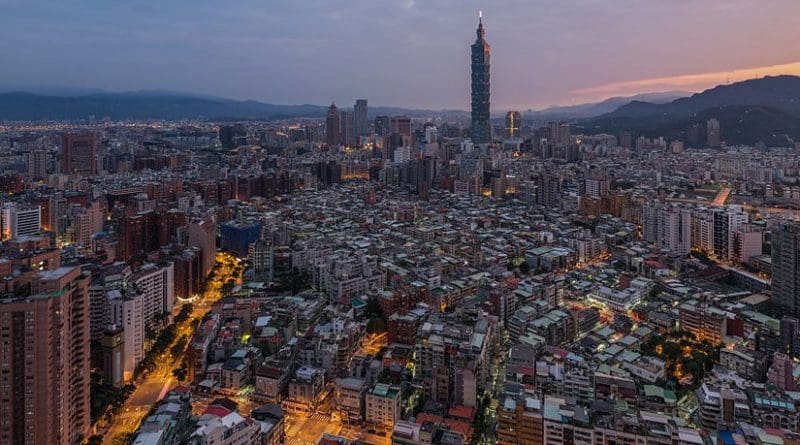Chinese Sharp Power And Taiwan-India Relations – Analysis
By IPCS
By Tai-Wei Chen
Beijing has extended its ‘sharp power’ strategy to the Taiwan-India relationship. It is important to understand how Chinese sharp power is deployed against the Taiwan-India relationship, and for both countries to proactively initiate counter-measures to safeguard this critical bilateral link.
The concept of China’s sharp power was ideated by a report, Sharp Power: Rising Authoritarian Influence, published by the US-based National Endowment for Democracy (NED) in early December 2017. According to it, sharp power involves three core methods: psychological operations, media manipulation, and legal warfare. This strategy is based on the asymmetry between a tightly controlled press and internet in China on the one hand, and an open society in its rivals on the other. Sharp power therefore weaponises the tools of soft power. In the Taiwan-India case, China is using the media to make India comply with a rigid ‘One China’ policy. Though each individual Indian concession is small and seemingly a public relations exercise, they add up to a deliberate Chinese strategy of using ‘One China’ to create a legal trap for India, even while China continues to undermine Indian sovereignty through similar means. Simultaneously this weakens India’s ties with possible economic and security partners like Taiwan.
Although Taiwan has no formal diplomatic relations with India, both countries have great opportunities for synergy. Taiwan’s has a burgeoning hi-tech sector with a ready job market, and the country has a deep understanding of the Chinese military. India’s need for job creation and search for greater knowledge of the Chinese military offer opportunities for a closer working relationship. Then Prime Minister Narasimha Rao initiated informal contact by establishing the India-Taipei Association. Since then, Taiwan and India have been consistently building contact. The two sides have signed many bilateral agreements on trade, investment, technology, education and culture. Current Prime Minister Narendra Modi has also advanced the relationship. The slow consolidation of relations between India and Taiwan can be traced back to 1995. Then BJP official (now prime minister) Modi visited Taiwan in 1999, and as chief minister of Gujarat in 2011 he hosted the largest Taiwanese delegation sent to India. However, while ‘India first’ is the cornerstone of Modi’s foreign policy, it does not seem be the kind of hard-line patriotism that emphasises military hegemony and expansion, and is instead based on the idea of the “world as one family.”
Similarly in her first press conference after taking charge in 2014, External Affairs Minister Sushma Swaraj said at the time that if China wants India to recognise the ‘One China’ policy, then China should also respect the ‘One India’ policy. Although ‘One India’ does not currently have a clear definition, it contextually refers to the Indian state of Arunachal Pradesh whose control by India is disputed by China – the latter considers it to be ‘South Tibet’. China appears to have violated the ‘One India’ principle by investing in Pakistan-controlled Kashmir, promoted as the China-Pakistan Economic Corridor (CPEC), and sending troops to patrol with the Pakistani army.
Indian strategists therefore seem to see India’s Taiwan policy through the prism of these ongoing Chinese violations of an as yet nebulous ‘One India’ policy. This brings in the third aspect of sharp power discussed above: lawfare. In forcing India to accept the clearly defined ‘One China’ principle, while constantly undermining the ill-defined ‘One India’ principle, China uses asymmetry to legally entrap India into concessions it may not willing to reciprocate. Though India has not stopped developing relations with Taiwan because of China’s pressure based on economic and other development needs, the question is, how far can such lawfare be taken towards completely undermining Taiwan-India relations?
Indian Prime Minister Modi recently attended an informal summit with Chinese President Xi Jinping in Wuhan. The two sides agreed to strengthen cooperation and there was some concern in Taiwan that this would be at the cost of Taiwan. The recent commotion over Air India renaming Taiwan to ‘Chinese Taipei’ was seen as indicative of this. However, what is to note here is that India did not change the name to what China requested, i.e., “China, Taiwan” but to “Chinese Taipei,” which would be a less than the desired result for China, even if it was a victory. Though insignificant by itself, it certainly damaged morale in Taiwan and the upward momentum of India-Taiwan ties.
The relationship however is fragile and both sides will need to take proactive measures to safeguard it. Indian policymakers must understand the nature of Chinese sharp power and how it has been played against India in the recent past. Taiwanese policymakers should understand the need to constantly showcase their relevance to India given the lack of formal channels. In particular, Taiwan should work to enhance the exchange of scholars, students and intelligence-sharing given that Chinese research is Taiwan’s internationally acknowledged strength. In short, both countries must wake up to Chinese asymmetric strategies and insulate themselves from the effects of Chinese sharp power deployment.

